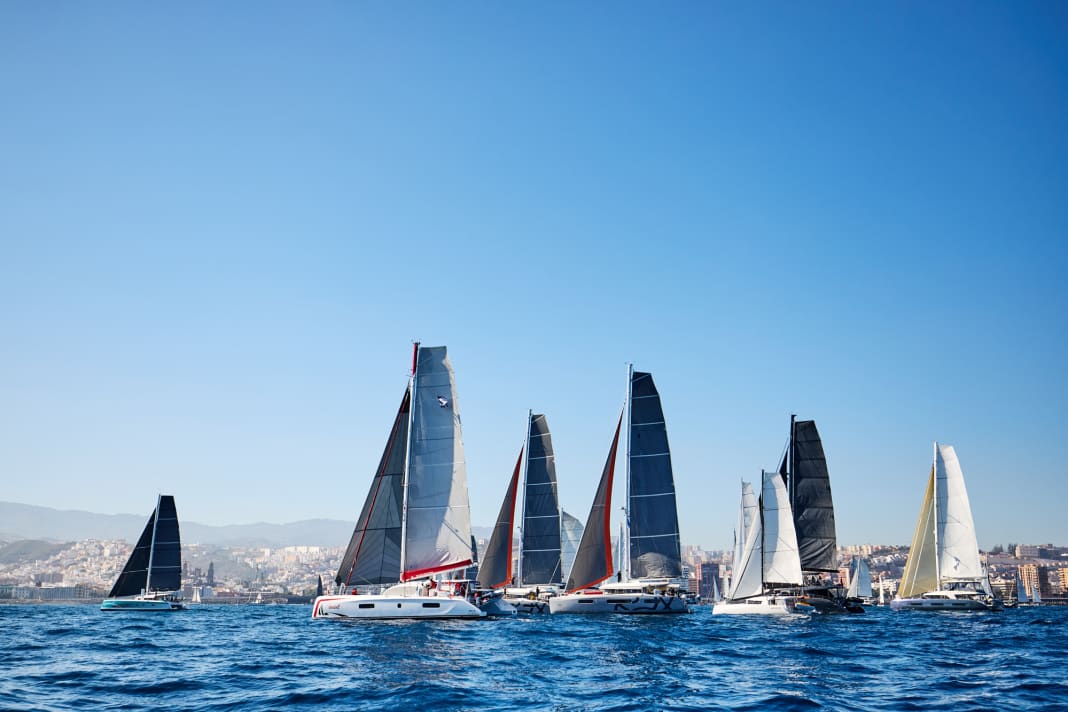





The people of Cologne have a wonderful saying: "Every Jeck is different!" It means that you accept the idiosyncrasies of your fellow human beings and don't immediately reject or even prejudge them. Something very similar can be observed every year on Gran Canaria. Worlds collide at the Atlantic Rally for Cruisers, ARC for short, whose participants always set course for the Caribbean from Las Palmas in November. The first glance at the boats that fill the jetties of the large yacht marina in the weeks before the start is enough to notice the differences. There are huge catamarans alongside conventional 45-foot yachts, which look downright tiny in the shadow of the two-hulls. Not to mention the occasional boats under 30 feet, which you have to keep an eye out for if you don't want to miss them.
The age and condition of the ships also varied enormously. Everything from 1973 to 2023 was on board last autumn. Embarking on the 2,700-mile passage with a supposed soul seller may seem strange to outsiders. The same goes for embarking on such a journey with a boat that is new to the shipyard and therefore largely untested. At the ARC, neither the one nor the other is unusual. No boat is excluded as long as it fulfils the organiser's safety regulations. And they are tough.
The crew constellations are also extremely varied. At the start, you can meet couples or small and large families with children from infants to teenagers. There are also crews of friends who want to have a blast together. Or the regatta freaks who want to be the first to arrive in St Lucia at all costs. But the ARC is just a rally, not a race. The berth charterers, on the other hand, often only get to know their fellow sailors in Las Palmas. It is not unusual for strangers to become friends for life on board during the trip.
The range of sailing experience is also considerable. At the ARC, the number of salt humps and greenhorns is roughly equal. Nobody complains about someone who has crossed the Atlantic many times. But what about those who embark on the adventure with virtually no previous sailing experience? At the ARC, beginners are welcome - and basically in the best of hands. There is probably nowhere else where sailors with in-depth blue water expertise are available in such large numbers as here. They are happy to share their knowledge.
We got to know many of the participants, and we introduce a few of them in this article. Their stories are different, but they all embarked on the journey with their own dreams, wishes and expectations. What united them was their common goal. They all achieved it.
Family crews at the ARC 2023
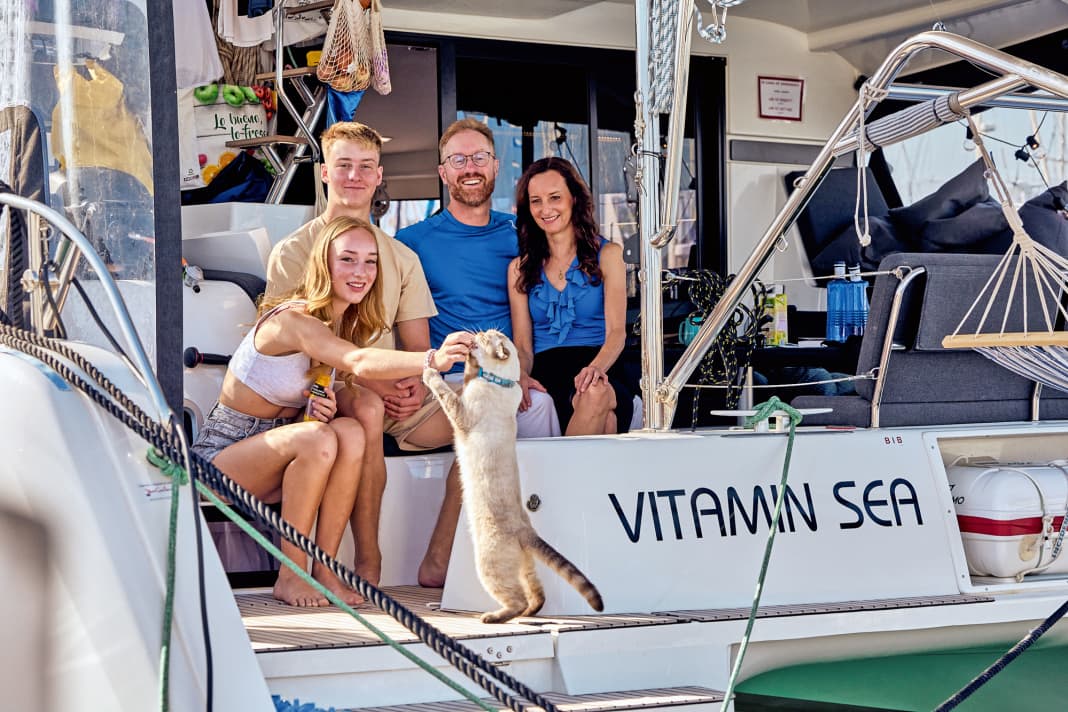



"Vitamin Sea":
Four Hanseatic sailors in search of adventure - how a lot of enthusiasm can make up for little sailing experience
Some seasoned sailors would probably shake their heads, but Doreen Hegemann doesn't mind. She says candidly shortly before the start of the ARC: "We are basically novice sailors. But we are a family in search of adventure. When we go on holiday, it's always on our own to mostly remote regions. Our children go along with us." The first time they were on a sailing boat was during a holiday on La Réunion. Back then, they went on a day trip on a catamaran. Peter Hegemann "tasted blood", as he says.
After his holiday, he went sailing with friends and became more and more enthusiastic. At some point, he harboured the dream of owning his own boat and taking time out at sea. He told his family about it and asked if they would join him.
Peter: "I was inspired by this concept of freedom. I deliberately formulated my plans as an offer. I didn't want to present my family with a fait accompli. Especially if the children had said no, I would have looked for another solution. But they agreed straight away." That was four years ago. Sailing school, licences and practice followed. But not much came together. Without the opportunity to sail with the ARC, the family would not have dared to cross the Atlantic.
"The rally is the perfect vehicle for our plan," says Peter. His plan works, and the four of them spend happy days on the Atlantic. On the way, Doreen writes: "We have a great time together, laughing, playing and enjoying the journey and the family time on board."
"Waymaker:
Rascals at sea with everyday life on board for ARC kids - romping, playing, cramming plus bakehouse and watchkeeping
Here, too, little to no sailing experience meets an almost unshakeable optimism that they will be able to cope with an ocean crossing. Perhaps it is the experience of everyday life with four lively children that has given Danielle and Todd Weiden an almost admirable composure. Added to this is certainly the hands-on mentality typical of many Americans: get on with it and get started instead of weighing up all the pros and cons at length. They only bought their boat from a charter fleet in Croatia in October 2022. They then sailed across the Mediterranean for a year without any previous experience.
"There was a lot of learning by doing," admits Todd openly. "But now we feel equipped for the Atlantic passage." Nevertheless, in the end they preferred to bring two experienced co-sailors on board. This leaves the parents time for the kids' school lessons as well as guiding the boat. They have to, even at sea. The experiment succeeds: 20 days after the start, the Weidens reach their destination on St Lucia safe and sound.
Also interesting:
Atlantic on the fast track
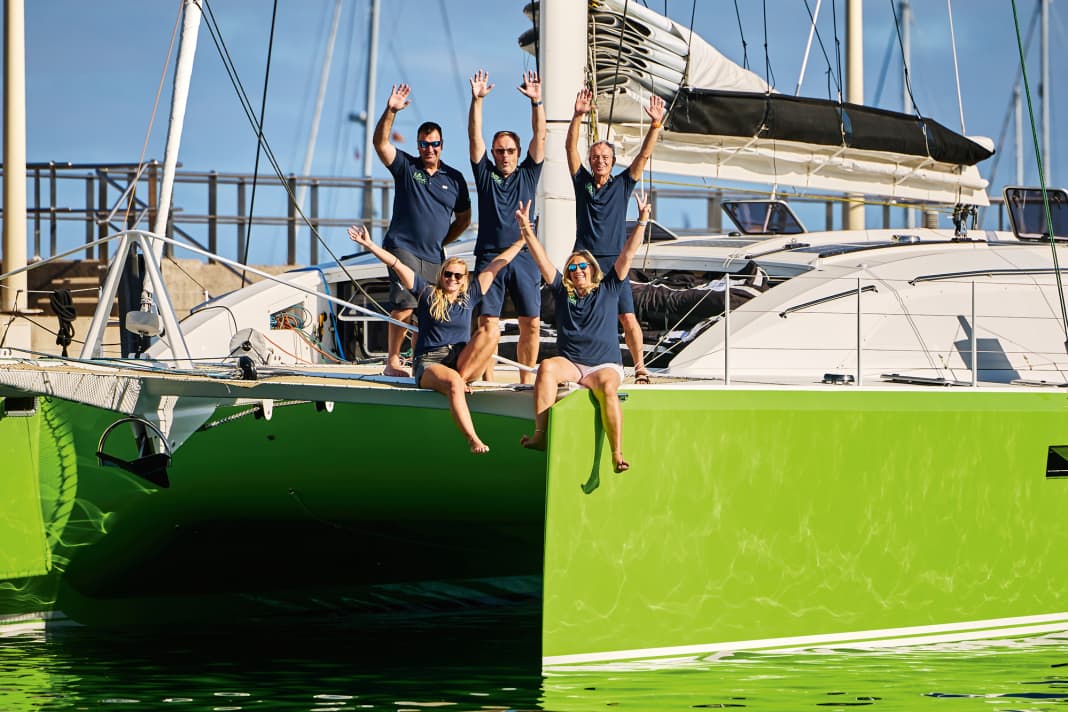




"Nica:
Unfinished Business
For long-time North German regatta sailor Gorm Gondesen, the Atlantic crossing was the start of something bigger: In mid-January, he and his wife Maren left St Lucia again to sail to the Pacific with the World ARC. Over the next two years, the pair want to sail all the way around the world. They had already attempted this once before, but were thwarted halfway by the outbreak of the Covid pandemic at the time. They stopped in New Zealand. There was one good thing about that.
At a regatta off Fiji, which they had previously taken part in, they were overtaken by a cat in the finish sprint on their monohull at the time. "Until then, I had always laughed at cats. But this defeat was a key experience. In New Zealand, I decided to commission one of my own," says Gorm. The result was the "Nica", a fast full-carbon twin hull, built at the Knierim shipyard in Kiel. Its co-owner Steffen Müller immediately sailed across the Atlantic with him; he signed on as a replacement for Maren, who was unable to attend the ARC.
"We sailed to St Lucia very relaxed. There would have been little point in pushing the boat. It's fully loaded for the circumnavigation," reports Müller, adding with a grin: "But the 'Nica' can't sail slowly after all." Gorm also admits that he can't quite let go of his regatta past: "Even though it's officially just a rally and we're sailing in the Cruising Division ourselves, you always look at what the others are doing and how well you're doing."
Why does he take part in the ARC at all? Gorm: "The ARC and the World ARC are great opportunities to meet nice people. And you don't have to do all the organising. That leaves much more time to enjoy the tour around the world."
"Saida:
ARC in all friendliness - with the oldest ship at an astonishingly brisk pace
After 17 days they reached the finish line: the Swiss sailors led by skipper Jürg Schneider. On paper, this does not look like a remarkable achievement. But as the trade winds weakened on the Atlantic, the 38th ARC turned out to be a very tough affair for the majority of the participants. As a result, the "Saida" was the 27th ship to reach St Lucia, coming fifth in its class. And this despite the fact that the 20 metre long Swan is already over 50 years old.
The good result is first and foremost down to the crew. They got down to business with ambition. No wonder, the eight men, all from the Lucerne area, have known each other since childhood. They conquered Lake Lucerne in the Opti, which is still their traditional home and regatta area. Jürg didn't get into big-ship sailing until 2015, when he came across the Swan in Palma and was thrilled: "I was immediately taken with her beauty, her build quality and the shipyard's reputation." After the Atlantic trip, the Caribbean regatta classics are now on the programme for the Swiss - how could it be otherwise? They will not return until after Antigua Sailing Week.
Comfortably across the big pond at the ARC 2023
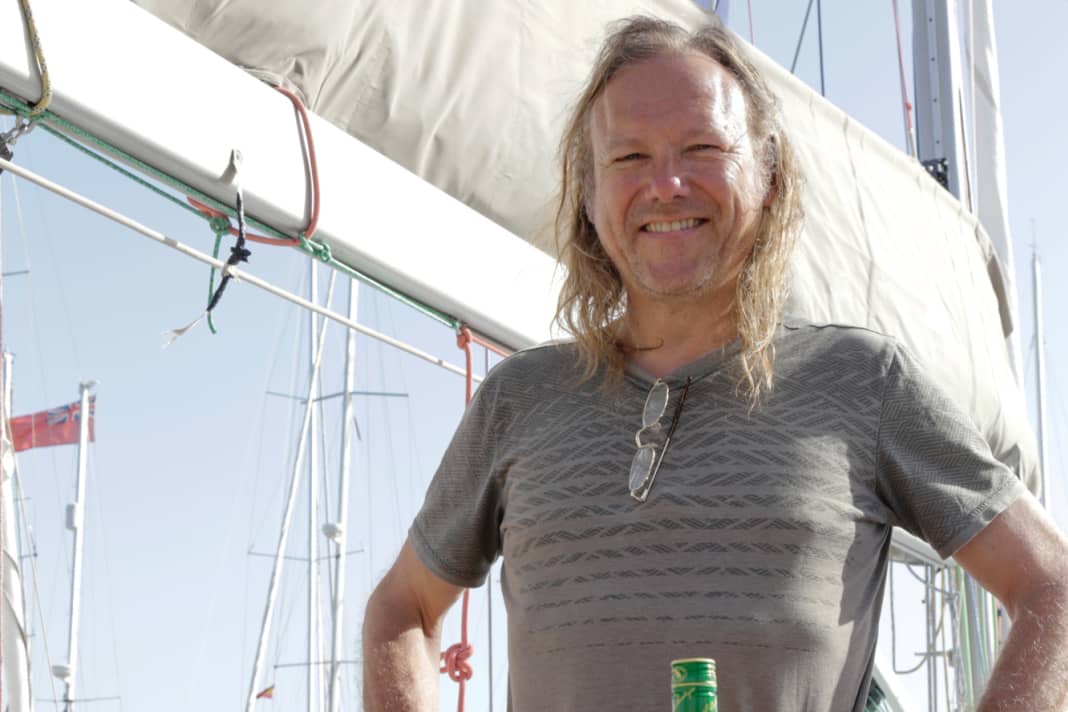




"Rhumexpress":
Steadfast to the finish of the ARC 2023 - despite storms, a few mishaps and a missed start, the crew stays on course
They made it at the last minute: after 23 days at sea, the five from the Hamburg-based "Rhumexpress" moored in Rodney Bay Marina in the north of St Lucia. Many exciting, sometimes exhausting and tiring days lie behind them. It is 15 December and the finish line has been closed for days. No matter, the main thing is that they have arrived in time for the big ARC closing party. It takes place the next evening. More importantly, the team spirit has not suffered, on the contrary!
It was all planned quite differently. In 2021, Bernd Holitzner bought an aged First 47.7 in Greece, transferred it to Kiel and made it fit for the long voyage. The self-employed management consultant quit his job to dedicate himself to new goals - in the world and in life. The first big project on his list was to take part in the ARC. To do so, he gets support on board, mostly hand-against-berth sailors. Even on the way to the Canary Islands, the crew is repeatedly challenged. There are several violent storms and the waves pile up high. A test for man and material. The latter cannot withstand all adversity. The power supply in particular causes problems.
It should stay that way until the ARC launch. The "Rhumexpress" misses it because the starter is on strike and a replacement is waiting in the wings. As stragglers, they set off on the crossing days later and have to contend with very light winds en route. But they persevere.
However, the skipper has to abandon one plan: Before the final party on St Lucia, he had wanted to make a detour to Martinique to visit rum distilleries there. He runs an online rum shipping business as a hobby. Hence the name of the boat. The only thing that didn't quite work out this time was the addition of "Express". But that's not a bad thing.
"Lulu:
Let's make haste - the children are out of the house, the savings are enough, the world is open. Let's get going!
Double-handed crews have become rare at the ARC. The average crew size is five sailors. But they still exist. Most of them are middle-aged to older couples who join the entourage across the Atlantic. Like Jodi and Magnus Andersson. The Swedish couple are seasoned sailors, but this is their first long-distance voyage. They have prepared thoroughly for it. First and foremost with a new boat. "We previously had an Oceanis. But that wasn't a blue water boat. We were looking for a boat that sails more comfortably, harmonises better with the long ocean swell and dives more smoothly into the waves. We found that with the Passad 38, a more classic design," says Magnus. And Jodi adds: "The 'Lulu' is simply perfect for our purposes. Comfortable, very easy to handle for two and also big enough."
They realised that the crossing would be longer and more strenuous for them than for many of the larger crews on longer ships. In the end, 22 days were on the clock. Compared to what was to follow, this was an insignificant amount of time. The world awaits at the bow of the "Lulu". Where exactly and for how long the two of them will be travelling to distant shores is not yet clear. Jodi: "It was important for us to fulfil our dream now. Who knows how much longer we'll be able to do that."
Berth charter to the Caribbean
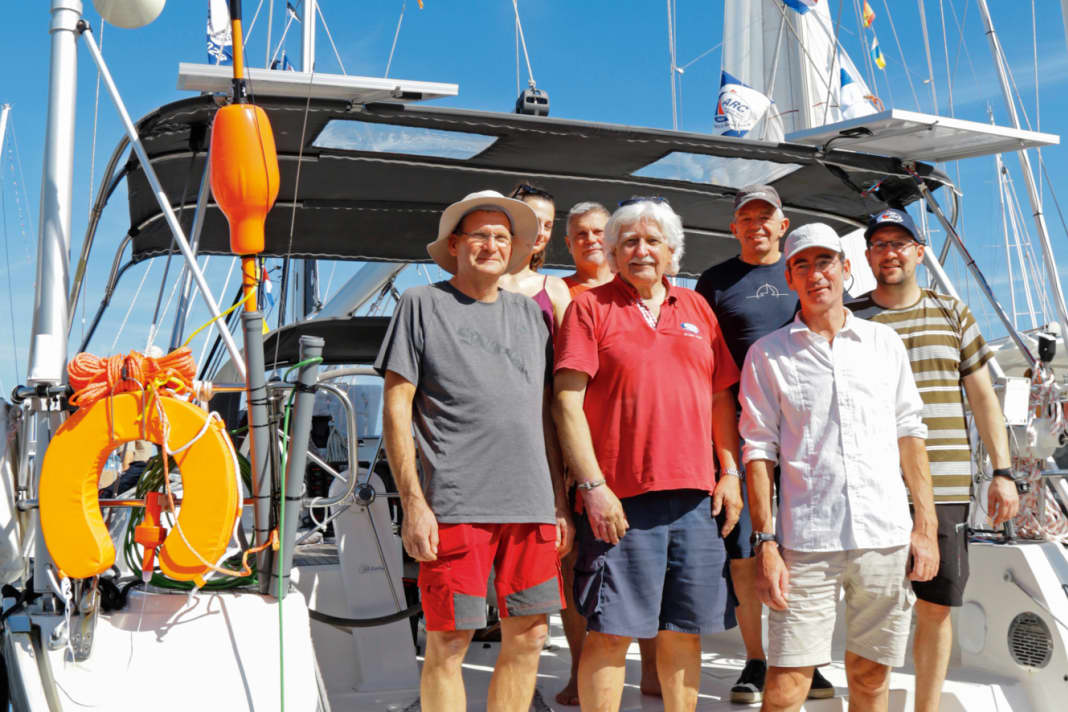




"Mola:
Skipper, coach and ship's cabin crew - 20 days at sea with strangers, can that go well?
As a salesman, Wolf Knipfer has had to be particularly good at one thing all his professional life: talking. Better: communicate. Recognising, assessing and responding to the wishes and expectations, but also the fears, of the other person. That helps him now. In his retirement, he spends up to 35 weeks a year as a professional skipper, organising a wide variety of trips with paying guests on behalf of charter companies. This time, he travelled to the Caribbean with the "Mola" from the German charter company of the same name on the ARC.
Wolf has already done this seven times, and this is his tenth Atlantic passage in total. There are now many like him at the ARC. "The other professional skippers can all sail too. The trick is to be able to form and lead a crew," says Wolf. "It's good if you're not a mouthful." Since coronavirus, he has introduced virtual crew meetings via video conference. He is sticking to this. "It has proved its worth. Everyone has the same level of information and we can harmonise experiences, expectations and ideas about the trip in advance."
Incidentally, this is easier on the ARC than on a two-week holiday cruise with berth charterers. "During the Atlantic passage, everyone is united by one big goal: to get across. On a sailing holiday, one person wants to anchor, while another wants to call at the harbour. One wants to make miles, the other wants to stroll around the bays."
Nevertheless, Wolf has skippered around 1,000 people in recent years. Conflicts are extremely rare. "I just have to create a good atmosphere. That's the secret. I'm not just the skipper, I'm also the onboard mess-maker." The Atlantic is of little concern to him. The journey to the Canary Islands is much more challenging. Wolf: "What comes next is wonderfully relaxed trade wind sailing."
"Skylark":
ARC like the first time - same procedure as every year!
Many yachts in the harbour of Las Palmas are decorated with ARC flags from previous years. This shows that someone who has been there is sailing here. On one boat, they extend from the pushpit to the masthead. It is the "Skylark 2". Its skipper, Dan Bower, is sailing to the Caribbean for the 17th time. On board are eight men and women from Sweden, the USA and England. Dan: "Sailing with bunk charter guests is sometimes easier, sometimes more challenging than going on a trip with friends or family.
Easier because it's clear from the start who's in charge on board. More difficult because you have to weld together a crew of strangers whose skills and knowledge you don't know." They take part in the ARC because everyone loves the event. "It's a great opportunity to get to know people and get a taste of the long-distance sailing atmosphere. There's also a lot of programme - and great parties!"
Also interesting:
The ARC in figures
2,700 nautical miles
is the shortest route for the ARC from Gran Canaria to St Lucia. The ARC-plus yachts, which start two weeks earlier, will first cover 850 nautical miles from Gran Canaria to Cape Verde. From there, they will then sail 2,150 nautical miles to Grenada
260 participant yachts
with 1,386 sailors from around 40 countries (ARC and ARC plus combined) took part in the ARC 2023 on 191 monohulls and 69 multihulls.
30 nations
were represented with a flag. Roughly a third of the boats came from Great Britain and the Channel Islands, twelve per cent from Germany and eight per cent from the USA.
6 years
old and 15.98 metres long was the average ARC 2023 boat. It was sailed by a crew of five.
32 metres
long was the largest participating yacht: the Maltese-flagged "Irelanda", designed by Hoek Design and built by Alloy Yachts.
10.11 metres
The Grand Soleil 34 "Lady Eleonora", sailing under the Italian flag, was the smallest boat in the fleet.
8 months
old was the youngest participant: Baby Emmett on "Sulyna" (GBR).
89 years
old was the oldest participant: Joff Hutchinson on "Carrick" (GBR).
24 years
old was the youngest skipper: the Swede Otto Lettevalle Forsgren on the Excess 15 "Faros".
79 years
old was Ron Burns on "NiteOut". He celebrated his birthday on the start day of the ARC.
61 Children
between the ages of one and 16 took part.
Monohull record:
8 days, 6 hours, 29 minutes, 15 seconds. Set by the maxi-racer "Rambler 88" (USA) skippered by George David in 2016.
Multihull record:
11 days, 12 hours, 12 minutes, 26 seconds. Set by the Marsaudon ORC 50 "Malolo" in 2022 under skipper Duncan Gladwell.

